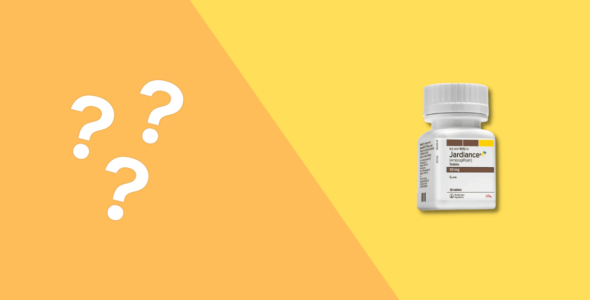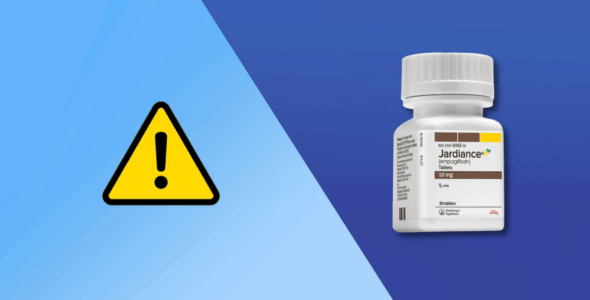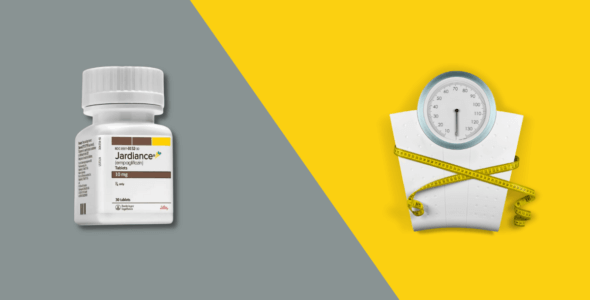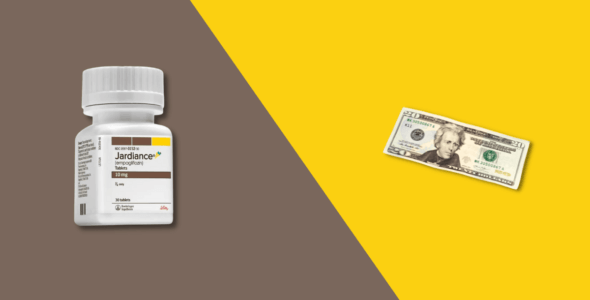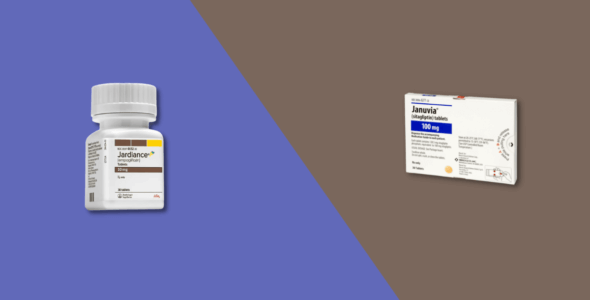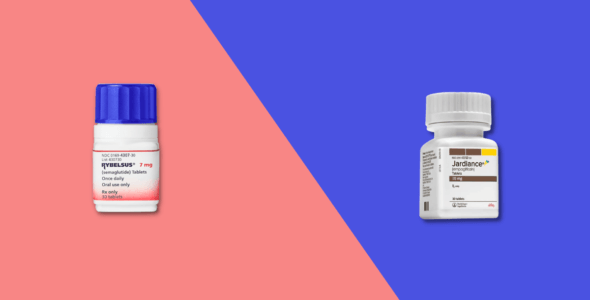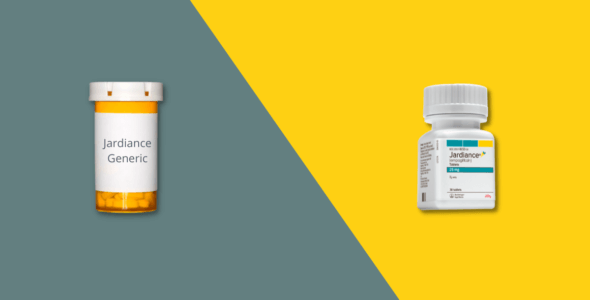Metformin is recommended as the first-line treatment for Type 2 diabetes mellitus by the American Diabetes Association. It is a generic anti-diabetic medication used as part of a treatment plan for Type 2 diabetes. It can be used alone or in combination with other medications.
Jardiance is the brand name for the prescription drug empagliflozin, also used for the treatment of type 2 diabetes mellitus. It belongs to a drug class called sodium-glucose cotransporter 2 (SGLT2) inhibitors.
Here we will explain how they work, their similarities and differences, their side effects, and more. This should provide you with the basics to better understand your options.
What is Jardiance?
Jardiance is an FDA (U.S. Food and Drug Administration) approved medication manufactured by Boehringer Ingelheim Pharmaceuticals, Inc. Jardiance is a diabetes medicine prescribed to adults with type 2 diabetes. It’s used to reduce high blood sugar levels when used alongside exercise and diet changes, and to reduce the risk of death by heart disease.
- In combination with diet and exercise to improve glycemic control in adults with type 2 diabetes mellitus
- To reduce the risk of cardiovascular death in adults with type 2 diabetes mellitus and established cardiovascular disease
- To reduce the risk of cardiovascular death plus hospitalization for heart failure in adults with heart failure and reduced ejection fraction
Jardiance can help you lower your blood glucose levels when taken alongside dietary and lifestyle changes. It causes you to excrete more sugar in your urine than you would normally. This lowers your blood sugar and helps to reduce your risk of health conditions like cardiovascular disease.
The active ingredient in Jardiance is called empagliflozin. It is used to lower blood sugar levels by causing you to lose more sugar in your urine than you usually would. Your kidneys help recycle sugar back into your blood from your urine, with the help of a protein called SGLT-2. Empagliflozin blocks this protein from working, reducing how much sugar your kidneys recycle. This makes you lose more sugar in your urine, rather than it being excreted back into your blood.
Jardiance dosage
Jardiance is available in tablet form, in the following doses: 10 mg, and 25 mg. The recommended dose of Jardiance is 10 mg once daily, in the morning, with or without food. Jardiance and metformin can be taken together. The drug Synjardy is a Jardiance-metformin combination.
What is metformin?
Metformin is an FDA (U.S. Food and Drug Administration) approved medication manufactured by various generic manufacturers. Metformin is in the drug class of biguanide, used as a first-line treatment for diabetes because of its mode of action in increasing your body’s insulin sensitivity. Also, metformin does not cause weight gain. Metformin effectively lowers fasting blood sugar and hemoglobin A1c levels.
It is used in combination with changes to diet and exercise to improve glycemic control in adults and pediatric patients with type 2 diabetes mellitus. It works by reducing the amount of glucose absorbed from your intestines, decreasing how much glucose is made in your liver, and improving your insulin sensitivity.
Metformin dosage
Metformin is available as an immediate release or extended-release oral tablet, or as an oral suspension.
Metformin is taken with a meal unless your doctor tells you otherwise. Do not crush, chew, or break the extended-release tablet. Swallow it whole. Your doctor may prescribe a glucagon injection kit in case you have severe hypoglycemia. You may also be prescribed extra vitamin B12 while you are taking this medicine.
Common side effects of Jardiance and metformin
The most common side effects of Jardiance in clinical trials include:
- Genital yeast infections in both men and women
- Needing to urinate more often and urinating more than usual
- Feeling more thirsty than usual
- Itching
- A skin rash – this may be itchy and include raised bumps and blisters that leak fluid, and may cause your skin to redden
- An increase in cholesterol levels
- Jardiance isn’t approved for weight loss, but weight loss is a possible side effect of the medication
More serious side effects of Jardiance include
- Severe allergic reactions to the medication
- Low blood pressure (hypotension)
- A rare but serious bacterial infection that damages tissue under the skin (necrotizing fasciitis) in the area between the anus and genitals (perineum)
- Diabetic ketoacidosis
- Hypoglycemia
- An increased risk of serious urinary tract infections
- Increased risk of bone fracture
- A high and potentially harmful increase in your cholesterol levels
- Dehydration
The most common side effects of metformin in clinical trials include:
- Low blood sugar
- Nausea
- Diarrhea
More serious side effects of metformin include
- Unusual muscle pain
- Trouble breathing
- Dizziness, feeling faint
- Feeling tired
- Stomach pain
- Vomiting
- Slow or irregular heart rate
- Lactic acidosis – symptoms include unusual muscle pain, difficulty breathing, stomach pain, dizziness, feeling cold, or feeling very weak or tired
These aren’t all the side effects Jardiance or metformin can cause. You can find more details in the patient leaflet that comes with your medication. If you have any concerns about side effects, talk to your physician or pharmacist.
Jardiance and metformin drug interactions
Jardiance can interact with other medications. These include:
- Any other diabetes medications, like insulin or sulfonylureas
- Diuretics
- Corticosteroids
- Estrogens
- Oral contraceptives
- Nicotinic acid
- Calcium channel blocking drugs
- Rifampin
Metformin can interact with other medications. These include:
- Antibiotics
- Diuretics
- NSAIDs
- Corticosteroids
- ACE inhibitors
- Antipsychotics
- Anticonvulsants
- Blood thinners
Jardiance and metformin can interact with other medications. This can change how Jardiance and metformin and other medications work and can make side effects more likely. Tell your prescribing physician about all your drugs, including vitamins and dietary supplements.
Jardiance and metformin contraindications
You should not use Jardiance if you:
- Are allergic to the active ingredient empagliflozin
- Are allergic to any of the other ingredients in Jardiance
- Have Type 1 diabetes (Jardiance is for type 2 diabetes only)
- Are under 18 years of age
Talk to your doctor before using Jardiance if you:
- Have liver or kidney problems or are on dialysis
- Have or have ever had problems with your pancreas, like pancreatitis or surgery on your pancreas
- Have a history of urinary tract infections or any problems with urination
- Often drink alcohol, or drink a lot of alcohol in a short period of time
- Are going to have surgery in the near future
- Are eating less than usual or have changed your diet
- Are pregnant or are planning to become pregnant
- Are breastfeeding or are planning to breastfeed
You should not use metformin if you:
- Are allergic to metformin
- Have severe kidney disease
- Have metabolic acidosis or diabetic ketoacidosis
- Are younger than 10 years old
- Are breastfeeding or are planning to breastfeed
Talk to your doctor before using metformin if you:
- Have kidney disease
- Have high ketone levels in your blood or urine
- Have heart disease, or congestive heart failure
- Have liver disease
- Use insulin or other oral diabetes medications
- Have a severe infection
- Have chronic alcoholism
- Are 65 or older
- Are pregnant or are planning to become pregnant
Other drugs for type 2 diabetes
If you have any concerns about Jardiance or metformin side effects, talk to your physician, or pharmacist for medical advice. Also inform your healthcare provider about any medical conditions, supplements, and over-the-counter meds you are taking. You are also encouraged to report side effects to the FDA: visit http://www.fda.gov/medwatch or call 1-800-FDA-1088.
